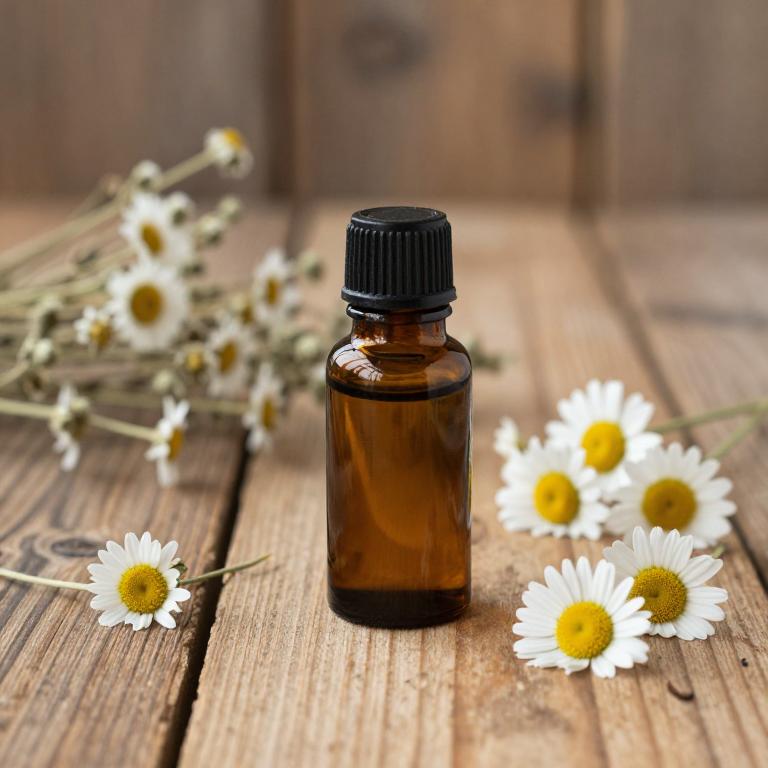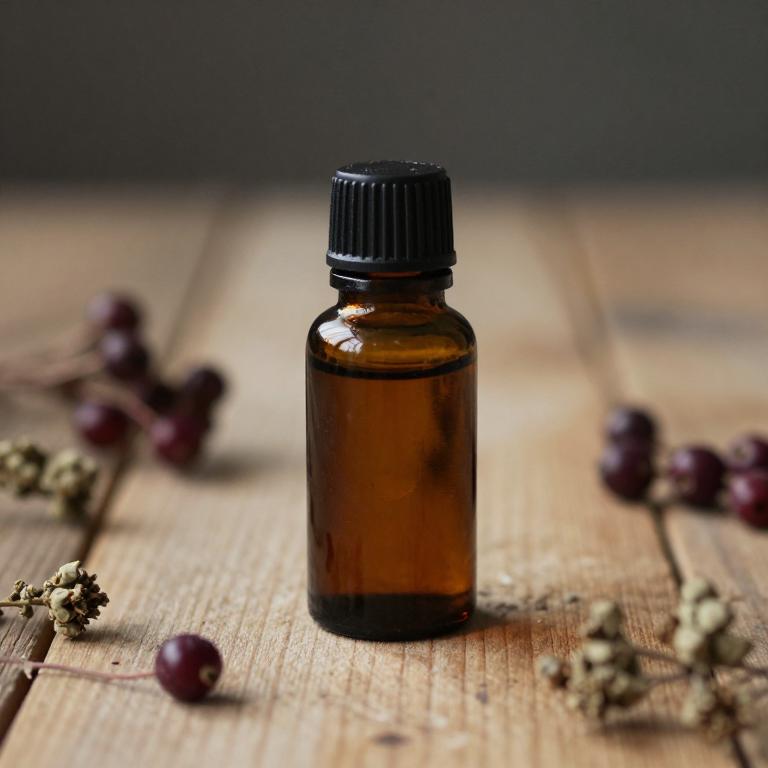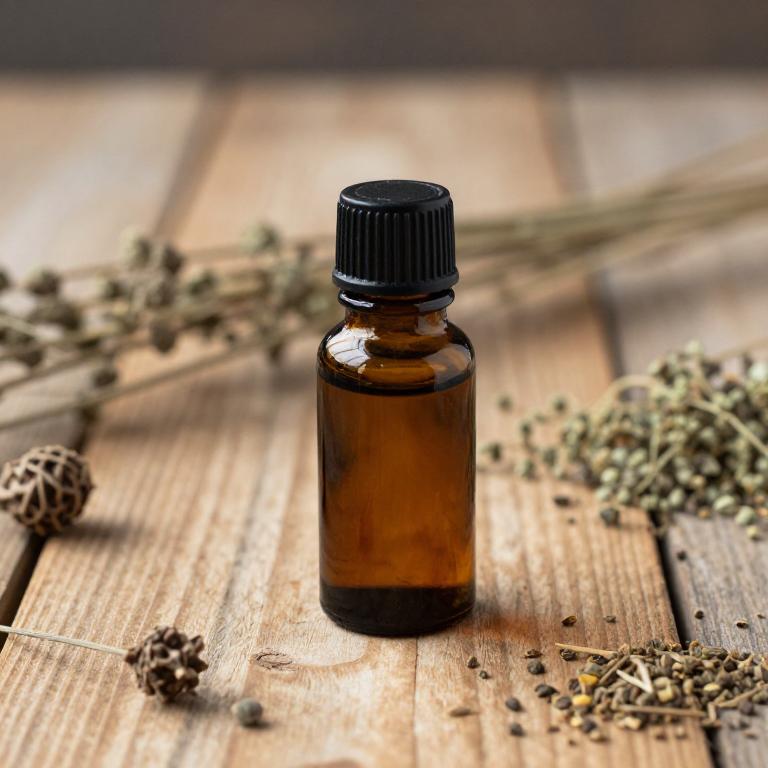10 Best Herbal Essential Oils For Stomach Discomfort

Herbal essential oils such as peppermint, ginger, and chamomile are commonly used to alleviate stomach discomfort due to their calming and digestive properties.
Peppermint oil is known for its ability to ease bloating and nausea by relaxing the muscles in the digestive tract, while ginger oil can help reduce inflammation and soothe nausea. Chamomile oil is often used for its soothing effects on the stomach lining, promoting relaxation and reducing cramping. These essential oils can be applied topically, inhaled, or diluted in a carrier oil for safe internal use, depending on the specific oil and intended application.
However, it is important to consult with a healthcare professional before using essential oils, especially for individuals with existing health conditions or those who are pregnant.
Table of Contents
- 1. Turmeric (Curcuma longa)
- 2. Black pepper (Piper nigrum)
- 3. Fennel (Foeniculum vulgare)
- 4. Ginger (Zingiber officinale)
- 5. Chamomile (Matricaria chamomilla)
- 6. Ceylon cinnamon (Cinnamomum verum)
- 7. English lavender (Lavandula angustifolia)
- 8. Dog rose (Rosa canina)
- 9. Cumin (Cuminum cyminum)
- 10. Thyme (Thymus vulgaris)
1. Turmeric (Curcuma longa)

Curcuma longa, commonly known as turmeric, contains essential oils that have been traditionally used to alleviate stomach discomfort.
These oils possess anti-inflammatory and antioxidant properties that can help reduce irritation and inflammation in the gastrointestinal tract. The active compounds, such as curcuminoids, contribute to the soothing effects on the stomach lining. When used in appropriate forms, such as essential oils diluted in a carrier oil, they may provide relief from bloating, indigestion, and mild gastritis.
However, it is important to consult a healthcare professional before using essential oils for persistent or severe stomach issues.
2. Black pepper (Piper nigrum)

Piper nigrum, commonly known as black pepper, contains essential oils that have been traditionally used to alleviate stomach discomfort.
The essential oils derived from black pepper, particularly containing compounds like piperine, possess warming and carminative properties that can help ease bloating, gas, and indigestion. These oils may stimulate digestive enzymes and improve gut motility, promoting better digestion and reducing discomfort. However, it is important to use these oils with caution, as they can be potent and may cause irritation if not diluted properly.
While some studies suggest potential benefits, more research is needed to fully understand their efficacy and safety for digestive health.
3. Fennel (Foeniculum vulgare)

Foeniculum vulgare, commonly known as茴香 or anise, is a herb widely used in aromatherapy for its soothing effects on the digestive system.
The essential oil derived from its seeds contains compounds like anethole, which have carminative and antispasmodic properties that help relieve stomach discomfort. It is often used to ease symptoms such as bloating, gas, and cramping by promoting smooth muscle relaxation in the gastrointestinal tract. When diffused or applied topically, this essential oil can also help reduce nausea and support digestion.
However, it should be used with caution, as it may interact with certain medications and is not recommended for pregnant women or those with specific medical conditions.
4. Ginger (Zingiber officinale)

Zingiber officinale, commonly known as ginger, is widely recognized for its calming effects on the digestive system and is often used in the form of essential oil to alleviate stomach discomfort.
The essential oil of ginger is extracted through steam distillation and contains bioactive compounds such as gingerol and shogaol, which have anti-inflammatory and analgesic properties. When used aromatically or topically, ginger essential oil can help reduce nausea, bloating, and cramping associated with digestive issues. It is often recommended for use in diffusers or diluted and applied to the abdomen for its soothing effects.
However, it is important to consult with a healthcare professional before using essential oils, especially during pregnancy or for individuals with existing medical conditions.
5. Chamomile (Matricaria chamomilla)

Matricaria chamomilla, commonly known as German chamomile, is widely recognized for its calming and soothing properties, particularly when used in the form of essential oil.
This essential oil is derived from the flowering tops of the chamomile plant through steam distillation, capturing the plant's aromatic compounds. It is often used in aromatherapy and topical applications to alleviate stomach discomfort, such as bloating, cramps, and indigestion. The oil contains compounds like bisabolol and chamazulene, which have anti-inflammatory and antispasmodic effects that can help ease gastrointestinal distress.
When used appropriately, Matricaria chamomilla essential oil can be a natural and effective remedy for mild digestive issues.
6. Ceylon cinnamon (Cinnamomum verum)

Cinnamomum verum, commonly known as true cinnamon, produces an essential oil that has been traditionally used to alleviate stomach discomfort due to its warming and anti-inflammatory properties.
The oil contains compounds like cinnamaldehyde, which may help soothe digestive issues such as bloating, indigestion, and nausea by promoting healthy gut motility. When used in aromatherapy or diluted in a carrier oil, cinnamon essential oil can help reduce tension in the digestive tract and ease discomfort. It is often recommended for use in diffusers or massage to provide a calming effect on the stomach area.
However, it is important to use it in moderation and consult with a healthcare professional before incorporating it into a treatment regimen for persistent digestive problems.
7. English lavender (Lavandula angustifolia)

Lavandula angustifolia, commonly known as English lavender, is widely used in aromatherapy for its calming and soothing properties.
Its essential oil has been traditionally employed to alleviate stomach discomfort due to its anti-inflammatory and antispasmodic effects. When diffused or applied topically, the oil can help reduce symptoms such as bloating, nausea, and cramping by promoting relaxation of the digestive tract. Studies suggest that the compounds in lavender oil, such as linalool and linalyl acetate, may interact with the body's nervous system to ease gastrointestinal distress.
As a natural remedy, lavender essential oil offers a gentle and accessible option for those seeking relief from mild stomach issues.
8. Dog rose (Rosa canina)

Rosa canina, also known as dog rose, is a traditional herbal remedy that has been used for centuries to support digestive health.
The essential oils derived from Rosa canina flowers and berries contain compounds such as flavonoids and phenolic acids, which may help reduce inflammation and soothe the gastrointestinal tract. These oils are often used in aromatherapy or diluted in carrier oils to alleviate symptoms of stomach discomfort, such as bloating and indigestion. While research on its specific effects on the stomach is limited, many practitioners believe in its calming and anti-inflammatory properties.
As with any herbal remedy, it is advisable to consult a healthcare professional before use, especially for individuals with existing medical conditions or those taking medications.
9. Cumin (Cuminum cyminum)

Cuminum cyminum, commonly known as cumin, is a popular herb whose essential oil is widely used for its digestive benefits.
The essential oil of cumin contains compounds like limonene and cumin aldehyde, which have been shown to aid in relieving stomach discomfort and promoting healthy digestion. It is often used in aromatherapy or applied topically to help ease bloating, indigestion, and nausea. Additionally, the oil may help reduce inflammation in the gastrointestinal tract, making it a valuable natural remedy for digestive issues.
However, it is important to use cumin essential oil in moderation and consult a healthcare professional before use, especially for those with existing health conditions.
10. Thyme (Thymus vulgaris)

Thymus vulgaris, commonly known as thyme, is a popular herb used in aromatherapy and herbal medicine for its potent essential oils.
The essential oil of thymus vulgaris contains compounds like thymol and carvacrol, which are known for their antimicrobial and anti-inflammatory properties. These properties make thymus vulgaris essential oil a potential remedy for stomach discomfort, such as indigestion and bloating. When used in diffusers or applied topically (diluted with a carrier oil), it may help soothe the digestive system and promote a sense of well-being.
However, it is important to consult a healthcare professional before using essential oils, especially for those with existing medical conditions or during pregnancy.